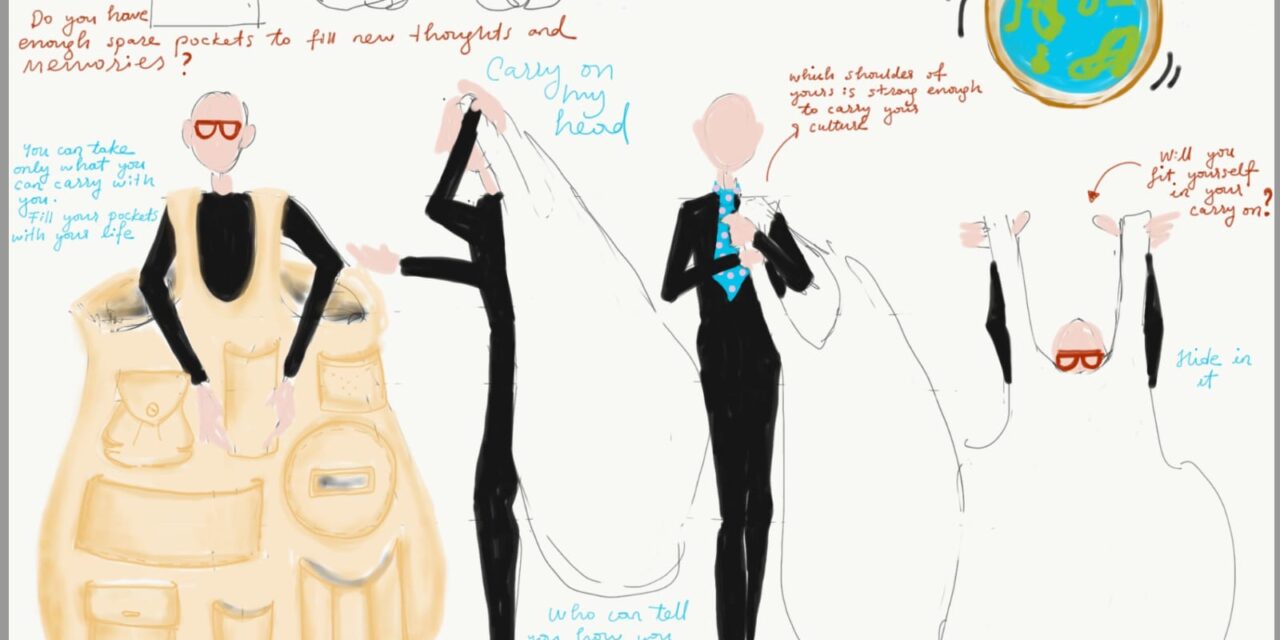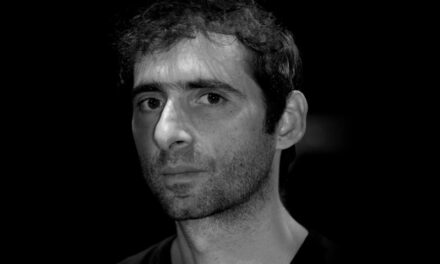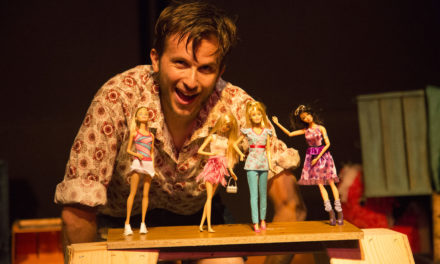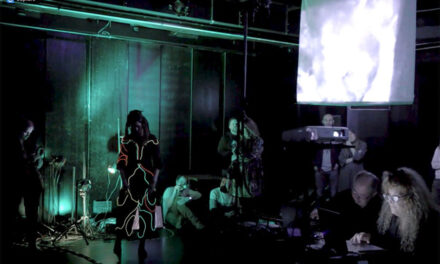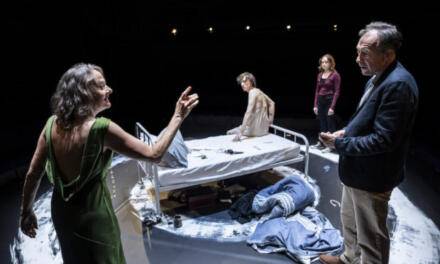In April 2020 Wine&Halva, a play by Turkish playwright and theater researcher Deniz Başar, had a staged reading at the University of Regina. Art Babayants from Toronto Laboratory Theatre directed it with a diverse student cast of non-native English speakers, immigrants, and people of color. According to the play’s marketing materials, people from these demographics are “often marginalized by the mainstream Canadian theater; a reality that [is] particularly visible in the theater microcosm of Regina, Saskatchewan.” The reading received financial support from the National Theatre School of Canada via the Art Apart program, an emergency fund for emerging artists affected by the COVID-19 pandemic.
In this conversation, Marjan Moosavi asks Başar about the creative process and her visions as a playwright living in the diaspora and writing for a North American audience. Also read Part I and Part II.
Marjan Moosavi: Do you think your works should be evaluated based on your origin, their aesthetic qualities, or both?
Deniz Başar: This is a difficult question. I know I would have said a definite “no” to being evaluated based on my origin before I immigrated. I am not sure now. I have realized that there is no neutral place to make or receive art. All art is a reflection in the experiences and world view of the artist, which are shaped by the larger contexts of geography, state borders, linguistic and religious politics, and so on. My life and experiences inevitably impact what I say and do in my work, but this is not rigidly about ethnic identity. I think I would still be offended if my work is only classified under labels like “Turk” “woman” or “immigrant” because I want to speak to some sort of universalism that is generally only granted to the white, Christian, male, cis-gendered, able-bodied, straight man. I want to be evaluated by my work’s aesthetic qualities, but my experience as an immigrant made me lose faith in the Anglophone theater world. It is only trained to read the semiotics of their own colonial whiteness, whereas my aesthetics are shaped by theater that I deeply adored on the contemporary stages of İstanbul. Therefore when I propose a different discourse and a different aesthetic, I am de facto considered “lesser” than them. So yes, I do want to be evaluated based on my aesthetic, but the question is, “are the global jury of gatekeepers qualified to judge my aesthetic?”
MM: Your play contains some of your “occidental” views, which understandably have been formed by the orientalist gazes that you received in your life in Canada. As I was reading your play, I came across the article The Worldly Exile by Rashid Khalidi about Edward Said’s most significant legacy for us, “cosmopolitan humanism.” “Cosmopolitan humanism” enables any person living between two worlds and in multiple cities with “cosmopolitan ease.” I agree with Said that practicing this empowers us to expand our ethical and political imagination, and “see the world in its entirety as our common home.” I would like to hear your perspective on the notion of the world as “our common home.”
DB: I think Salman Rushdie also has a concept called “translated men.” But it means something different to be a translated woman, I guess. I haven’t read the article you mention so I can only guess the meaning of the term. “Cosmopolitan humanism” can be problematic, but the concept of “cosmopolitan ease” is interesting. I do not read my own struggle in terms of dualism between two opposing cultures, or a split identity. That would be reductionist. There are places in the world that are not Turkey or Canada, and since I feel like I couldn’t find a place to put down roots in either of these countries, I will continue searching. To be able to do that I need some cosmopolitan ease.
My journey over the last six years has transformed me, but also overcoming some of these struggles freed me from some of the chains that were holding me back. In Turkey, we always belittle ourselves by thinking that nothing we do can be good enough since we lack resources. Canadians have these resources but they lack imagination. Therefore, the art I experienced in Turkey is way more sincere, idealistic, and truthful than any I have seen in Canada. Of course, there are exceptions, but this is my general observation. There were multiple cases where I was mesmerized by the amount of waste in theater productions I have seen in Canada – a waste of time, waste of capacity, waste of money, waste of effort, waste of talent – because contributors were too scared to imagine other ways of doing things. These observations have freed me, and I now know that I have build my artistic vision in one of the most artistically vibrant, cosmopolitan, and paradigm-challenging cities in the world: İstanbul. Because I now know it through embodied experience, no one can take this knowledge away. No one can bully me into belittling my own work or my fellow artists’ work again. This journey transformed my view of the world, and made me seriously engage with the concept of the world as “our common home”, and the deep injustices and historical biases of this common home.
Because of the people I met in Canada who are from countries I know nothing or very little about, I have become interested in the theater histories from their countries. There is comfort in finding comradeship in unexpected places. It is soothing to see that in China or Ghana’s theater, people have discussed similar things with theater practitioners from Turkey throughout the 20th century. It makes you feel less alone.
MM: Do you think we can finally drink wine with halva?
DB: We already drink wine with halva! The funny thing is, they don’t immediately make a sensible pair like wine and cheese does. It is like saying you like drinking wine with chocolate or cake. But it does go together well, just as Farias and Derya go well together, even though it doesn’t make sense at first sight.
A similar question came up when I was at Regina. One of the students who was working with me on the dramaturgy of Wine&Halva was Muslim, and he asked why I paired these two, when – you know – alcohol is haram. There are countless medieval poems, both written and sung, by Anatolian folk poets and by court poets about wine drinking during the Ottomans. There is also the poetry of Omar Khayyam, who celebrates drinking wine. As far as I know, alcohol has never been banned in Turkey. We even have a national alcoholic beverage that we are very proud of, called “rakı.” Of course, there are many people who chose not to drink in Turkey, but it is not imposed by law, and there would be a serious backlash if the government tried to ban it. At the moment they are trying to attack the drinking culture by imposing high taxes, but that wasn’t the case before the current government. Until a few decades ago, there were state-managed rakı factories, which slowly got privatized due to neoliberalism. I have learned drinking culture from my family: how to make appetizers, how to keep the conversation flowing, how to let silences full of potential grow, how to listen deeply as people open up, how to allow room for people if they want to share a secret, how to take care of each other when we are vulnerable. Drinking culture in Turkey taught me to take care of people and allow myself to be taken care of by friends when we let ourselves be vulnerable. Turkey shares culture with the Balkans, Mediterranean coastal countries, the Black Sea nations, as much as it shares culture with Muslim countries that are also classified under the vague and colonial term “the Middle East”. And yes, there are Muslims who drink, too. There are people who think that as long as you don’t hurt anyone, enjoying life with friends is a good thing.
The name of the play comes from the poem Hello Darling by Arkadaş Zekai Özger, which is included in the play’s prologue. It is probably one of my all-time favorite poems. Every time I read it, it speaks to my heart. At the beginning of the poem Özger says “i am a person who speaks little, gets tired a lot / i like drinking wine with halva”. This poem is complex because he refers to wine drinking, Allah as love, homosexuality, and his own sadness from not being understood. He was also a communist who was probably the target of some bullying in 1970s machismo leftist circles because of his sexual identity. This is covertly referred to in another queer writer’s novel, so that’s how I know it. So there are many layers there: wine doesn’t make sense with halva but that is how he likes it, communists should have been atheists but he refers to God, Muslims should not drink but he drinks, he should not have been gay, but he is. The world doesn’t understand him, and he shares his disappointment without blaming anyone. Arkadaş Zekai Özger died very young due to a concussion he got in a police raid on his campus where he was doing his Bachelors. He never saw his book of poems published; we know his poetry through posthumous collections. Poems like Hello Darling, and artists like Arkadaş Zekai Özger, give me hope about humanity and remind me that I’m not alone.
This post was written by the author in their personal capacity.The opinions expressed in this article are the author’s own and do not reflect the view of The Theatre Times, their staff or collaborators.
This post was written by Marjan Moosavi.
The views expressed here belong to the author and do not necessarily reflect our views and opinions.

